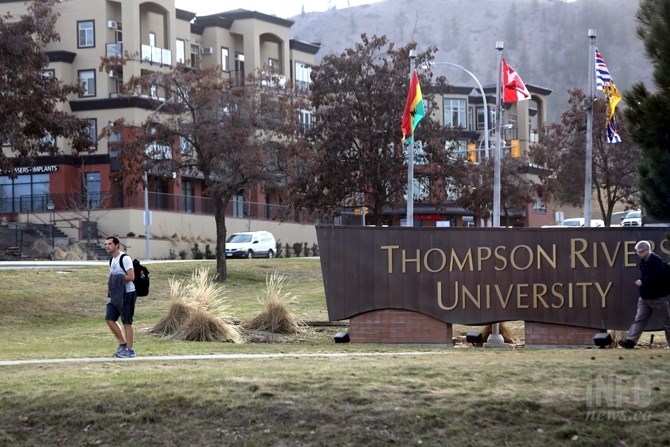
(JENNIFER STAHN / iNFOnews.ca)
April 10, 2015 - 2:34 PM
KAMLOOPS - Pinpointing the root of racism could take a lifetime of research. But preventing its perpetuation is what brought together professors, students and community members to do what many bristle at when it comes to the topic: They talked about it.
Last week at Thompson Rivers University, the Indigenous Law Students’ Association hosted a discussion to speak about institutional racism and its impact in society from family to campus and the workplace. The panel, moderated by law student and former white supremacist Daniel Gallant, featured local lawyer Michelle Good, law program alumnus Chris Albinati and the university’s executive director of aboriginal education, Paul Michel.
Good kicked off the talk by explaining how racism is carried throughout generations via oral storytelling. She explained how stereotypes become cemented through repetition and saw it demonstrated during her term as a professor.
“I asked my class ‘what do you know about aboriginal people? Everybody was just brutally uncomfortable. I said ‘let’s just talk - what do we know?’” she said. “Before you knew it all the stereotypes started coming out.”
Free housing, less taxes and problems with addiction were some of the first statements Good heard.
“Then I said ‘okay, how do you know this?’ None of them could (reply). That fuelled my thinking more. They know it through oral history. They know it through what has been told to them throughout the ages,” she said. "The fire to keep it alive is not done with intention. Those perceptions that have been engrained in people, it takes its place. It finds its place in the hiring committee, in the classroom. It’s unavoidable."
Michel pointed out while many speak of stereotypes, learning about the people’s history and forced assimilation in B.C. has gone ignored.
“There were over 500,000 people in British Columbia prior to contact. Then the population declined. What’s that story? What’s that genocide?” he asked the TRU lecture room filled with students and faculty.
Michel said it troubled him how many people don’t know the “negative story of Canada” and noted the deleterious effects of ignorance when it comes to learning about different First Nations. He said students who take his classes on first nations history are surprised by what they hear or what they didn’t know before.
“Education can transform people but it’s one learner at a time,” he said.
Albinati said he only recently learned about his indigenous Philippine heritage through his grandmother who never talked about it openly before. He said after emigrating to Canada, his family members decided only English would be spoken at home and many cultural customs were halted in order to be accepted as newcomers.
“She never told any of us about our history (before). It’s interesting how these ideas are passed down and identities are reconstructed,” Albinati said.
To counter prejudice, speakers advocated for more open discussions, but each pointed towards the value of education on aboriginal history. For Ron Ignace, chief of the Skeetchestn Indian Band, who attended the talk, moving forward will require a reconstruction of society as a whole.
"Racism is systemic in Canada. It is an ideology that is embedded and is the cornerstone of the socioeconomic foundation of Canada. It’s a systemic problem that we (have) to confront. The system has to be totally turned on its head,” he said.
To contact a reporter for this story, email Glynn Brothen at gbrothen@infonews.ca, or call 250-319-7494. To contact the editor, email mjones@infonews.ca or call 250-718-2724.
News from © iNFOnews, 2015